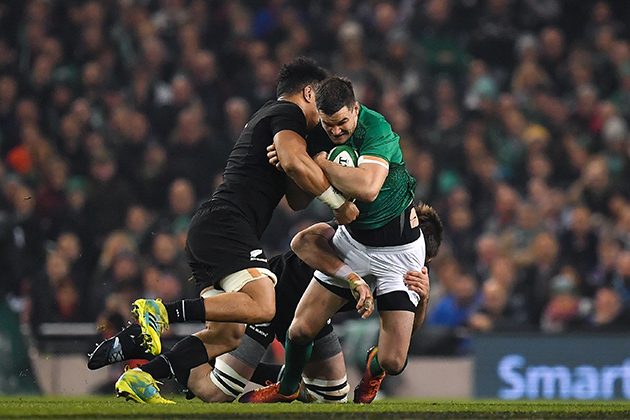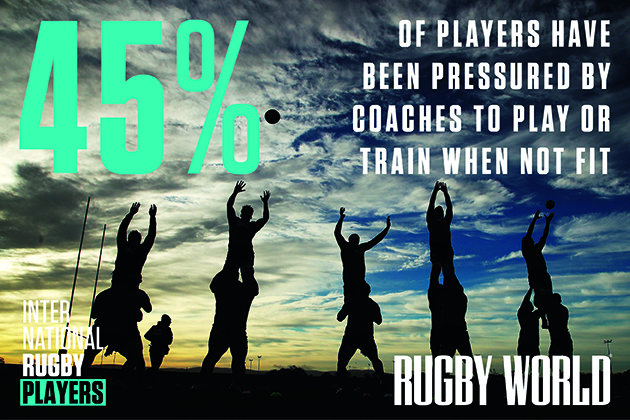Plan for new international competition is flawed, with too much focus on money and not enough on player welfare
Opinion: Players right to hit back over World League plans
News originally broke about a proposed ‘World League’ or ‘League of Nations’ last year with the goal of making all Tests more meaningful.
Plans that were mooted included an expanded Rugby Championship involving Japan and Fiji as well as promotion-relegation in that competition and the Six Nations.
The top 12 teams would all play each other across a year, with semi-finals and a final in November/December between the leading nations.
While I liked the idea of Fiji and Japan (or whatever teams were at 11th and 12th in the world rankings) playing at a higher level and introducing promotion and relegation in the two big annual competitions to give lower-ranked teams an incentive to progress up the global ladder, there were also numerous flaws. Will it devalue the World Cup? How does the club game fit in? What about player welfare?

Making strides: Under the proposal Japan would join the Rugby Championship (Getty Images)
Now it seems the only plus points – in my view at least – of the proposal may be dispensed with. The NZ Herald have reported that the current plan is to have a closed shop of just 12 teams – the Six Nations staying as it is and Japan and the USA joining the Rugby Championship.
No promotion/relegation. No route for Pacific Islands – Fiji, Samoa and Tonga – or growing European sides like Georgia to get involved in the action. And this plan would likely be in place for 12 years.
World Rugby insist a competition involving promotion and relegation is their goal, but there are numerous stumbling blocks to achieving this with so many stakeholders involved.
My position and my proposal has always been the same since day 1
12+12 with promotion/relegation with enough rest periods for the players.
Nothing has been decided yet, and I doubt it will, I won’t stop trying.
1/2— agustin pichot (@AP9_) February 28, 2019
Nations Champ’s is still an evolving concept that continues to be shaped by multiple and complex stakeholder discussion. Objective is to propose a more compelling and sustainable global international game for fans, players and Unions. Discussions continue with all stakeholders.
— Brett Gosper (@brettgosper) February 28, 2019
Looking at the mooted shake-up revealed by the NZ Herald, it’s great that Japan and the USA would be involved, but there’s little doubt the potential of those financial markets will have been considered when making these plans.
For Tier Two countries to develop, they need to play Tier One nations more often, not less, so if these plans go ahead you could see lower-ranked countries actually go backwards in terms of progress.
On top of that, the ramifications for player welfare are hugely concerning. Northern hemisphere teams would play three Tests in the southern hemisphere in the July window. Whereas now they usually play against one country, under this plan they would be travelling between three on successive weekends.

Closed shop: If the plans go through Tonga would not play Tier One teams (Getty Images)
Playing New Zealand, Japan and Argentina, for example, would be a nightmare in terms of flights, jet lag, logistics and so on.
It would be the same for the Rugby Championship teams during their tournament, with numerous time zones involved.
On top of that, the plan to play five Tests on successive weekends at the end of the year to determine who will win the ‘World League’ is absolutely brutal – and the players have rightly spoken out about this.
International Rugby Players president and Ireland fly-half Johnny Sexton says: “The issue of player load has never been so topical, however needs to be properly understood. To suggest that players can play five incredibly high-level Test matches in consecutive weeks in November, is out of touch and shows little understanding of the physical strain this brings.”
BREAKING: Players highlight “major concerns” around World Rugby’s proposed International Competition
Read what the world's top players have to say here: https://t.co/XwuPbUcUdg#PlayersUnited pic.twitter.com/4WHCGwfI7c
— InternationalRugbyPlayers (@IntRugbyPlayers) February 28, 2019
All Blacks captain Kieran Read also sits on the International Rugby Players Council and says: “We need to be very careful that we balance the commercial needs of the game with the player welfare needs, and ensure the quality and integrity of matches meets expectations.
“Fans want to see meaningful games; they don’t want to see fatigued players playing a reduced quality of rugby as part of a money-driven, weakened competition that doesn’t work for the players or clubs.
“With new technologies, new broadcast deals and new money coming into the sport, this is a crucial moment for rugby and one that many players are generally excited about. However, we have to make sure that the integrity of the game and welfare of the players is protected.”
BIG READS ON RUGBY’S BIG ISSUES
What the players think about rugby’s biggest issues
Find out what Test stars think about workload,…
The opportunities and the obstacles for Pacific Islands rugby – a special report
Following Rugby World's recent trip to the Pacific…
Playing through the pain: an investigation into painkiller use in rugby
“OUR DOC used to walk around with a…
England captain Owen Farrell also highlighted how the new plans appear to have given little thought to the club game. The top clubs in England and France will hardly be cheering at the suggestion of being without their big names for five or six weeks in November-December.
“Players are definitely open to discussing a new global season, but what we develop has to work with the club game in order to reduce conflict, deal with player release issues and make sure their welfare is looked after,” says Farrell.
The absence of promotion-relegation will also limit the progress of Tier Two nations, with Samoa captain Chris Vui saying: “For countries in this bracket and for Pacific Islanders in particular, our biggest issue has always been the ‘club versus country’ factor.
“We feel that that a 12-year deal is not workable, particularly when it presents no hope of advancement during that period. This will have the dangerous knock-on effect of luring senior players away from their countries and more towards the clubs, which is the exact opposite of what we’re all trying to achieve.”
World Rugby have responded to say that International Rugby Players have been involved in the discussion process. Their statement added: “It is inappropriate to comment on specifics whilst wider stakeholder consultation, including with IRP, is ongoing.
“However, it is important to note that some assumptions made in the statement regarding the proposed competition structure are inaccurate and that important matters such as playing load and emerging nation opportunities are at the heart of constructive dialogue on the overall concept.”
Let’s hope that is the case. Having a proposal that appears to put financial gains far above player welfare and developing the sport in myriad nations rather than just the privileged few smacks of the self-interest that has so often held the game back.
Until those making these decisions behind closed doors open their eyes to the bigger picture and what is best for the sport and the players rather than the unions’ bank balances, rugby will never fulfil its true potential.
Follow Rugby World on Facebook, Twitter and Instagram.








